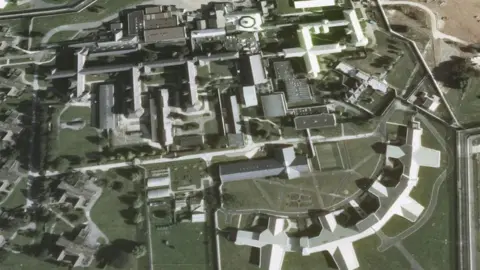Rampton: Inspectors take action against high-security hospital
 Google
GoogleInspectors have taken action against a high-security psychiatric hospital after they found understaffing had caused patients to be locked in their rooms for extended periods.
Rampton Hospital has been rated "inadequate" by the Care Quality Commission (CQC) following an inspection in June and July.
The CQC also raised concerns over staff supervision, training and medicine.
Hospital bosses said they were working hard to improve services for patients.
The Nottinghamshire site houses serial killer Beverley Allitt and Deividas Skebas, who killed nine-year-old Lilia Valutyte, and is one of three "high-secure" hospitals in England, according to the CQC.
It provides services to people who are detained under the Mental Health Act 1983 and are classified as having a learning disability, mental illness or psychopathic disorder, or both.
It was inspected after the CQC had warned it needed to make significant improvements following a previous visit in September 2022.
Greg Rielly, the CQC's deputy director of operations in the Midlands, said it was "disappointing" the trust that runs the site had failed to make the necessary improvements.
"We found the hospital didn't always have enough nursing and medical staff to keep people safe," he added.
"Staff regularly confined people to their bedrooms and limited their access to activities and leave from their room, due to low staffing numbers.
"This meant people weren't having any fresh air, which wasn't good for their health and wellbeing."
'Enforcement powers'
There were more than 101 occasions when wards were placed in "early confinement" due to the staff shortages between February and June 2023, according to the CQC report.
Cheltenham ward, part of the learning disability service, was placed in early confinement at 14:30, which meant patients were confined for 17 hours and 30 minutes.
In addition, staff did not always use restraint and seclusion appropriately, according to the inspectors, who said a patient had self-harmed because of early confinement due to low staffing levels.
The CQC also said staff "had not ensured accurate titration (adjusting the balance) of some medicines", meaning "patients were exposed to the risk of having higher doses of medicine than required".
Concerns were also raised over a lack of formal supervision for staff, and added not enough staff were trained in British Sign Language to meet the needs of deaf patients.
The watchdog has now taken further enforcement action, which prevents the hospital admitting anyone without prior written agreement from the CQC.
Mr Rielly added: "We will continue to monitor the hospital closely and will return to carry out another inspection to ensure improvements are sustained and embedded.
"If this doesn't happen, we won't hesitate to take further action in line with our enforcement powers."
Ifti Majid, chief executive of the Nottinghamshire Healthcare NHS Foundation Trust - which runs Rampton Hospital - said the safety and wellbeing of patients was a "priority" and staff had "worked incredibly hard" to improve services.
He added the trust had recruited 75 nurses and healthcare support workers since the report was written, improved training, communication with deaf patients and reduced daytime confinements.
Mr Majid added: "We know from the feedback we have received from the CQC that tangible improvements have been made over the last seven months.
"However we know that we still have more work to do, and importantly we need to embed and sustain all of the improvements we make.
"We will continue to work closely with the CQC, our colleagues, and importantly those who use our services and their families, to focus on continuing to improve the experience for those who use our services."

Follow BBC East Midlands on Facebook, on X, or on Instagram. Send your story ideas to [email protected].
